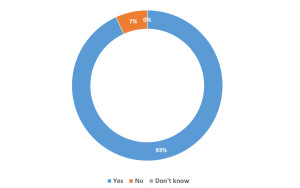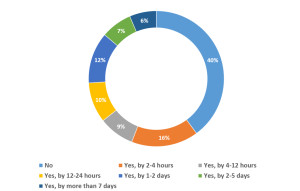Data has become a buzz term and bugbear all in one recently, with Peter Sondergaard of the Gartner Group calling it the oil of the twenty-first century, while all around us, we are told its volume is increasing exponentially and each new day brings tales of breaches, losses and failed analytics projects.
Amid this fog of opportunity tempered by fear and uncertainty, TechPro, in association with Datapac, asked Irish IT professionals to tell us about their data experiences, from where and how it is stored to how it is backed-up, protected and tested.
This TechBeat survey was carried out in June with 192 respondents from across various sectors and organisation sizes.
The survey started by simply asking if data had ever been lost at work. The vast majority (93%) said yes, with just 7% saying no, with no one undecided. This comes as no surprise, according to Karen O’Connor, general manager service delivery, Datapac.
“While the result is not a surprise, it highlights the scale of the problem. The vast majority of respondents have lost data,” said O’Connor. “With data volumes continuing to grow rapidly, this is a problem that is not going to go away. Irish organisations need to find and implement business continuity solutions which offer greater levels of protection and assurance.”
The next question asked whether the lost data was recovered. Again, the vast majority (85%) said it was, though a worrying 13% said it was not, with 2% saying they did not know. The 85% is very encouraging, but the 13% is unacceptably high, according to O’Connor.
Looking for further detail, respondents were asked about the recovery. A slim majority (51%) said that all of the data was recoverable, with a further quarter confirming the more than 80% of the data was recovered. Below this, 4% were able to recover 50-80% and 5% recovered 20-50% of lost data. However a fairly significant 14% were able to recover less than 20% of the lost data.
“These are very worrying results,” admits O’Connor. “The percentage of organisations unable to recover all lost data is high. There are very stringent compliance regulations in place to ensure Irish organisations can store, access and retrieve business data. The penalties for non-compliance are severe. Looking at these results, many Irish organisations may be exposed if they have lost business data for good. That’s why it’s crucial to have systems and processes in place which can minimise the risk of losing data.”
O’Connor said that as well as large fines for non-compliance, other associated problems for businesses that lose data include reduced business performance, poor customer service and loss of revenue and customers. “Losing customer data can also be very bad for your organisation’s brand if this becomes public,” O’Connor warned.
The next question asked about the recovery time frame, and whether there was overrun.
Two in five (40%) respondents said that the recovery time was as expected. Some 16% said that it took 2-4 hours longer than expected, with 9% saying it took 4-12 hours longer. One in 10 reported recovery times of 12-24 hours longer than expected, with a further 12% reporting more than 1-2 days over. Seven per cent of respondents reported that recovery took 2-5 days longer than expected, with another 6% reporting that it took a week longer than expect to recover data. Taken together, that is a very worrying 35% of respondents who took more than 12 hours longer than expected to recover data — and this is data that was recoverable.









Subscribers 0
Fans 0
Followers 0
Followers